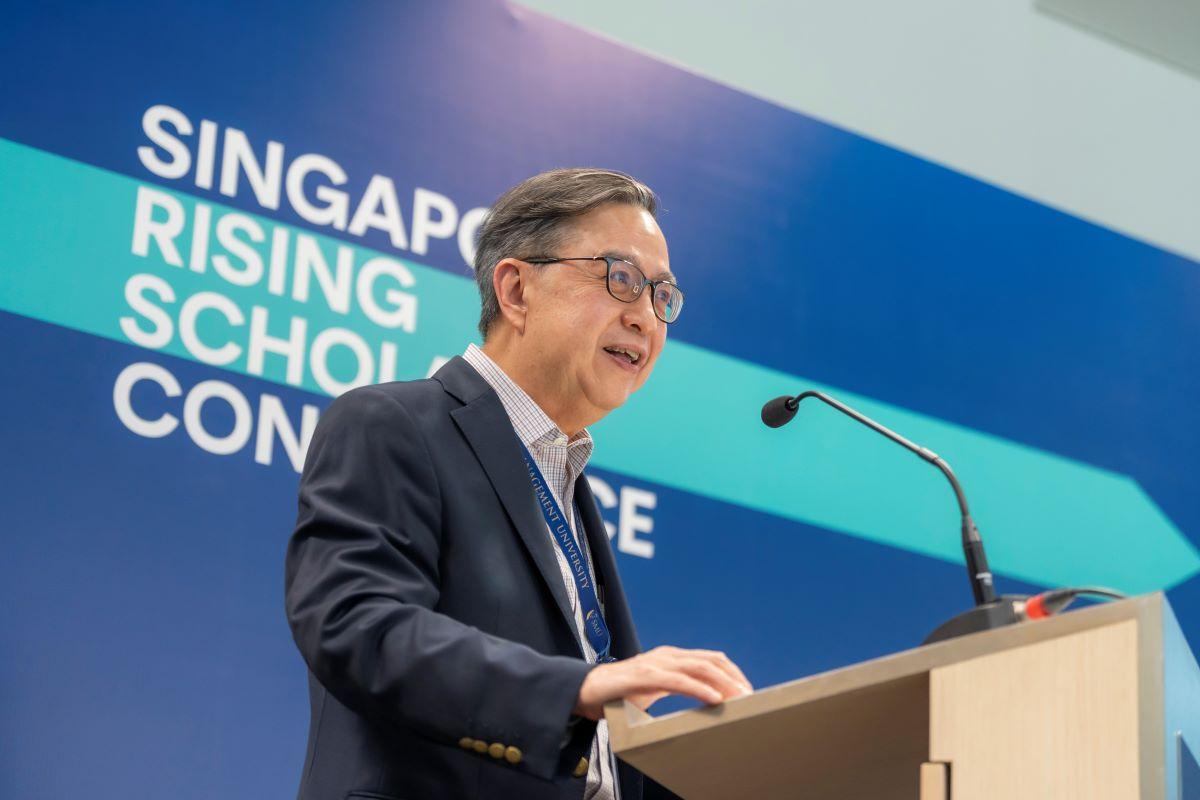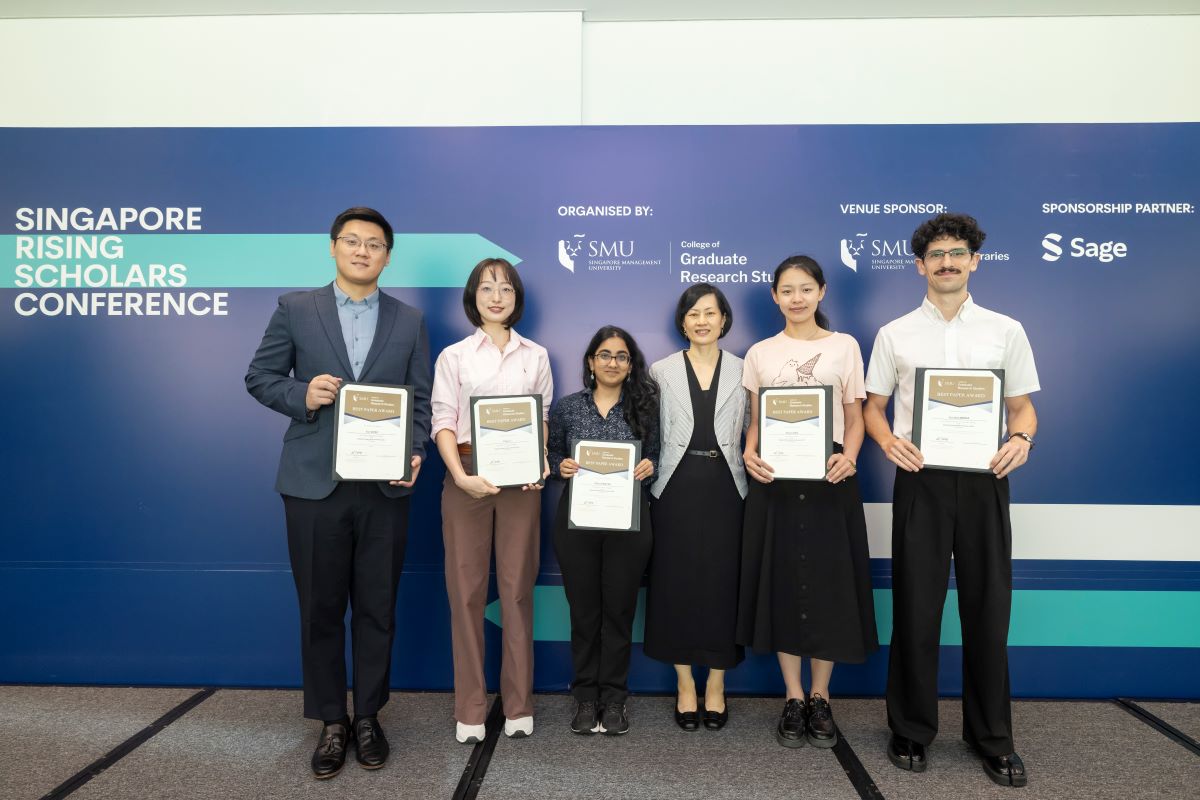SMU’s strength: building knowledge in collaboration with peers

Those who embark on their PhD journeys at SMU are no longer simply students, but promising colleagues who co-create knowledge with the rest of the faculty.
This was the key message from SMU Provost Professor Alan Chan during his keynote speech at the annual Singapore Rising Scholars Conference (SRSC), which saw 115 participants gather for two days of peer-to-peer networking. It was organised by the College of Graduate Research Studies (CGRS), which promotes interdisciplinarity in SMU postgraduate research programmes.
The event was held on 15 and 16 May 2025 at the SMU Li Ka Shing Library; doctoral students from various universities around the world presented their work, received feedback, and had the opportunity to grow their networks and connections for their academic futures.
Some 60 papers were presented from 20 institutions including École nationale des ponts et chaussées, Fudan University, Peking University, The University of Hong Kong, Thammasat University, Universitas Airlangga, the National University of Singapore, and Singapore University of Technology and Design. The fields spanned the social sciences, psychology, corporate governance, information systems, marketing, and management strategy.
SMU Librarians also organised seminars on how to write literature reviews, how to conduct text analyses using no-code or light-code tools, and how to raise research visibility by publishing. Nine PhD students received the Best Paper Award at the end of the two-day event.
For attendees, the event was a chance to exchange research ideas, improve their perspectives, and receive feedback and questions to further improve the quality of the papers that PhD students are working on.

Nine PhD students from universities around the world received the Best Paper Awards at the second annual Singapore Rising Scholars Conference. Five are photographed with Dean of the College of Graduate Research Studies, Professor Heli Wang (fourth from left). The recipients are [L-R] Zhao Yue from Singapore Management University, Ying Li from National University of Singapore (NUS), Chitra Pratap from NUS, Gao Huaxi from Peking University, and Luciano Brina from Singapore University of Technology and Design.
The risks of passive consumption of knowledge
Prof Alan Chan noted that one of the most pressing challenges faced by scholars now is the use of Artificial Intelligence (AI).
While AI can help significantly in research and education, students still need to master the new digital tools available, as over-reliance on AI is non-trivial. “The ease with which people can use AI to churn out literature reviews and entire studies should sound an alarm bell,” he observed. “AI can hallucinate,” he added. “If we do not use AI tools with critical judgment and discernment, it will only encourage passive consumption of knowledge and erode sound habits and discipline of mind.”
“An important challenge is to design AI tools to expand knowledge and deepen understanding, tools that will enhance critical thinking and communication and not as a substitute for active intellectual engagement,” Prof Chan said. “This will require researchers and scholars in STEM disciplines as well as the social sciences and management to come together to co-create digital tools that will enrich learning, and indeed the human experience.”
“To render AI truly serving the interest of humanity,” Prof Chan stressed, “we will need to embrace interdisciplinarity from the ground up, at the very beginning of the design phase, to ensure that important questions about ethics, values and human judgment are integrated into the very design of AI tools.”
He added that interdisciplinarity is at the core of SMU PhD programmes: “Interdisciplinarity works best when like-minded individuals come together with similar concerns addressing large, complex issues. And that is the kind of PhD experience that we want to encourage.”
Giving scholars an immersive peek into the PhD journey
For the first time, CGRS also welcomed participants on the Rising Scholars Fellowship Programme (RSFP), an immersive event in which eligible master’s and bachelor’s degree students get a taste of the PhD journey by participating in the SRSC. They all had the opportunity to attend presentation sessions by doctoral students and explore new research ideas with them.
Prof Heli Wang, Dean of CGRS, said: “What differentiates RSFP from other outreach programmes is the fact that it is immersive and personalised. It is not just an info session but an experience. Each fellow follows a discipline-specific track, interacts directly with faculty, and experiences our research culture up close.
“We believe that the fellowship programme will become a key part of SMU's strategy to build a vibrant and diverse PhD community,” she added. “And inspire greater interest in academic careers and deepen regional engagement among our graduate education faculty and researchers.”
See also: Building Knowledge as Community – The Real Deal of the SMU PhD Journey | SMU Newsroom


